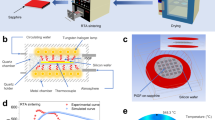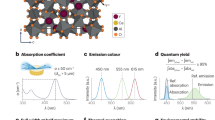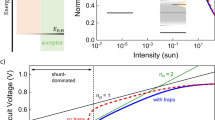Abstract
IN the derivation of the decay curve for phosphors of the recombination type with traps at one single depth, Randall and Wilkins1 have assumed that there is no retrapping of electrons. In a subsequent paper2 they show, however, that the cross-sections for electron capture of the traps and the empty luminescence centres are about equal. After a long decay period there are many more empty traps than empty luminescence centres and consequently retrapping must be important.
This is a preview of subscription content, access via your institution
Access options
Subscribe to this journal
Receive 51 print issues and online access
$199.00 per year
only $3.90 per issue
Buy this article
- Purchase on SpringerLink
- Instant access to the full article PDF.
USD 39.95
Prices may be subject to local taxes which are calculated during checkout
Similar content being viewed by others
References
Randall, J. T., and Wilkins, M. H. F., Proc. Roy. Soc., A., 184, 366 (1945).
Randall, J. T., and Wilkins, M. H. F., Proc. Roy. Soc., A., 184, 390 (1945).
Mott, N. F., and Gurney, R. W., "Electronic Processes", 135 (1940).
de Groot, W., Physica, 6, 275 (1939).
Pringsheim, P., Trans. Faraday Soc., 35, 87 (1939).
Author information
Authors and Affiliations
Rights and permissions
About this article
Cite this article
KLASENS, H., WISE, M. Decay of Zinc Sulphide Type Phosphors. Nature 158, 483–484 (1946). https://doi.org/10.1038/158483a0
Issue date:
DOI: https://doi.org/10.1038/158483a0
This article is cited by
-
�ber die mit Phosphoreszenz verkn�pfte elektrische Leitf�higkeit von Cadmiumsulfid-Kristallen
Zeitschrift f�r Physik (1952)
-
La projection sur un grand écran d'une image de télévision quelques progrès récents
Annales des Télécommunications (1950)
-
Luminescence Processes in Zinc Sulphide Phosphors
Nature (1946)



